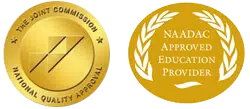Knowing exactly how alcohol addiction is defined and how to spot common signs of this substance use disorder can help you determine whether yourself or a loved one could benefit from professional treatment.
What Is Alcohol Addiction?
Alcohol addiction is both a mental illness and complex brain disorder. The National Institute on Drug Abuse (NIDA) defines alcohol addiction as a “chronic, relapsing disorder characterized by compulsive alcohol seeking and continued use despite harmful consequences and long-lasting changes in the brain.”
Alcohol addiction is also known as alcohol use disorder, which encompasses both physical dependence and psychological addiction. It’s possible to be physically dependent on alcohol without being addicted, though alcohol addiction usually refers to a combination of both. People who drink high amounts of alcohol on a consistent basis can become physically dependent and may eventually become addicted when alcohol use becomes part of their normal lifestyle and changes the structure and function of their brains.
What Is the Prevalence of Alcohol Addiction?
Alcohol addiction affects nearly 15 million people in the United States aged 12 and older, reports the National Institute on Alcohol Abuse and Alcoholism (NIAAA). This number includes approximately 9 million men and 5.5 million women. Alcohol addiction also affects an estimated 414,000 youth between the ages of 12 and 17.
Furthermore, nearly 26% of adults report binge drinking regularly, while 6.3% report engaging in heavy alcohol use regularly. According to the NIAAA, binge drinking is defined as drinking behavior that brings blood alcohol concentration levels to at least 0.08 g/dL in about two hours. Heavy alcohol use is defined as binge drinking on five or more days during the past month.
What Are Risk Factors for Alcohol Addiction?
Alcohol addiction can affect anyone, though certain risk factors may increase the likelihood of becoming addicted. According to the NIDA and other researchers, common risk factors for alcohol addiction include:
- Aggressive behavior early in life
- Lack of parental supervision
- Peer pressure
- Early exposure to alcohol
- Easy access to alcohol
- A family history of substance abuse and addiction
- Poverty
- Poor social skills
- Binge drinking on five or more occasions in one month
- Mental illness such as depression, anxiety, or schizophrenia
- Low self-esteem
- High stress
Some people drink alcohol to feel better and relieve difficult emotions such as stress and depression, while others drink to feel its relaxing, pleasurable effects. The NIDA further states that some people may drink alcohol to feel more social and confident, or because they feel pressured to do so in social situations. Whatever the reason a person may drink alcohol, this behavior becomes troublesome when it starts causing problems with their health and everyday life.
What Are Signs and Symptoms of Alcohol Addiction?
Alcohol addiction is characterized by 11 signs or “diagnostic criteria” that indicate that drinking has become problematic in a person’s life. A person addicted to alcohol usually also exhibits one or more physical symptoms that indicate they are misusing alcohol.
Signs and symptoms of alcohol addiction and misuse include:
- Drinking alone
- Having a high tolerance for alcohol/drinking more to feel the effects
- Having poor personal hygiene
- Smelling like alcohol
- Difficulty trying to control or reduce alcohol use
- Making excuses to drink alcohol
- Having strong cravings or urges to use alcohol
- Experiencing alcohol withdrawal symptoms (i.e., nausea, vomiting, shaking) when not drinking
- Having frequent blackouts/memory loss after a night of drinking
- Continuing to drink even when it causes or worsens physical and mental health problems
- Continuing to drink even when it causes social, financial, and legal problems
- Spending lots of time obtaining alcohol, drinking, and recovering from the effects of alcohol
- Missing work or school due to drinking
- Becoming aggressive, angry, or violent when confronted about alcohol use
- Giving up important activities to drink alcohol instead
- Developing serious, chronic alcohol-related health conditions, such as cirrhosis
How Can Alcohol Addiction Be Effectively Treated?
Several treatments are available for alcohol addiction, as some people may respond better to some treatments than others. However, evidence shows that alcohol addiction is best treated with a combination of medical detoxification (detox) and behavioral therapy. Medical detox treats physical dependence on alcohol, while behavioral therapy treats psychological addiction to alcohol.
Behavioral Therapy
Behavioral therapy helps people change harmful behaviors and attitudes related to alcohol use that may be contributing to their addiction. Cognitive-behavioral therapy, family therapy, motivational interviewing, and motivational incentives are common therapies used to treat substance use disorders, reports the NIDA. These therapies are conducted one-on-one and in groups and are available in both residential and outpatient treatment settings.
12-Step Support Groups
Alcoholics Anonymous (AA) is a 12-step peer support group program that helps people stop drinking. This group therapy is available at addiction treatment centers and in communities and is completely free to attend. Many people who complete alcohol rehab programs choose to keep attending AA meetings for several months or years after their treatment programs end, as these meetings help them stay sober and accountable for their actions. AA meetings are available in nearly every town and city and cater to people of different ages, genders, and backgrounds.
If you or someone you care about has a drinking problem, consider contacting a Baystate Recovery Center to learn more about your options. Treating alcohol addiction as early on as possible can reduce the risk of related complications and get you or your loved one back on track with healthy living.
Baystate Recovery Center, a clinically Infused 12-Step Treatment Center for Drug and Alcohol Addiction, was founded by two partners in addiction treatment services, John Checchi and Michael Wilson.



